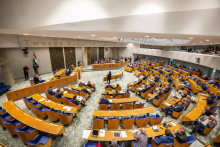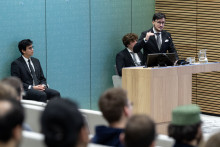engD / PDENG
An EngD programme (previously called PDEng) is a two-year doctoral programme. Unlike a PhD programme, which focuses on scientific research, an Engineering Doctorate focuses on the direct needs of industry. EngD projects are always tailor-made and developed in consultation with companies. The degree can currently be obtained within the 4TU.Federation, consisting of the four universities of technology in the Netherlands – Twente, Delft, Eindhoven and Wageningen.
The PDEng degree has existed for about 35 years and the UT started offering it in 2012. Why the sudden name change? ‘The Universities of Applied Sciences (HBOs) may soon start offering a similar programme with a Professional Doctorate degree,’ explains Hans Voordijk, the EngD programme coordinator at the UT. ‘To make the distinction clear, universities in the 4TU federation have decided to change their degree to ‘Engineering Doctorate’. On top of that, PDEng was a degree name known only in the Netherlands. EngD, on the other hand, is also known in other countries. It’s a more international degree.’
Potential to grow
Voordijk hopes the name change will also boost the programme. ‘On yearly basis, there are about 120 students starting a new EngD project at all 4TU universities combined. At the UT, we have about 20 students starting per year. However, the idea is to double this number. The University of Twente has EngD programmes in the fields of Business & IT, Civil Engineering, Energy & Process Technology, Maintenance and Robotics. Especially the Robotics and the Business Information Technology programmes have a lot of potential to grow.’
Finding the right candidates has been a challenge, explains Voordijk. ‘Interaction with companies is a big part of doing an EngD and it is difficult to find candidates who are enthusiastic about that. The salaries are also quite low at the moment, but there are ongoing discussions about increasing those to match the first year PhD salaries. On top of that, it is not a well-known programme among companies. PhD is an established concept, but PDEng is only known in certain networks.’
Broader scope
The programme coordinator believes this could be improved by broadening the scope of offered projects. ‘There are now only five UT programmes where EngD is offered. We would like to be more flexible and create possibilities for more departments and for more multidisciplinary projects. Just like we do for PhD projects,’ says Voordijk. ‘We definitely want to broaden the topics for EngD.’
'It allows us to strengthen the connection with industry'
‘It is important for us to offer the EngD, because it allows us to strengthen the connection with industry,’ says Professor Bart Koopman, dean of the Faculty of Engineering Technology where most of the programmes are offered. ‘From the perspective of a graduate, it’s a nice alternative. If you graduated from a Master’s programme, you used to have two options: either go into industry or do a PhD. However, some students want to further develop in research, but not necessarily as PhD candidates. An Engineering Doctorate is a good alternative, because it’s somewhere in between the two. It’s a good way to mix research and training.’
‘The programme is also very interesting for companies,’ adds the dean. ‘They get in touch with the university, but don’t have to commit for four years – like with a PhD. This is especially beneficial for small companies that often don’t plan that far ahead, but are interested in innovation. It’s a really good option for them, because it gives them direct access to knowledge developed at the university. For us, as a university, it helps to strengthen the connection with industry and society. It also nicely links to life-long learning and challenge-based learning initiatives, which are becoming increasingly important.’
One programme
Professor Koopman agrees that the Engineering Doctorate programmes at the UT haven’t reached their full potential yet. ‘I’m not dissatisfied with what we have achieved so far, but I think we can achieve much more. It’s good that the EngD programme is now more integrated within the Twente Graduate School. We want to have a university-wide accreditation for the programme. That will give us a lot more possibilities. Simply put, we want one general EngD programme for the whole university, tailored to the students and company's needs and interests. That is the ambition at the UT.’







